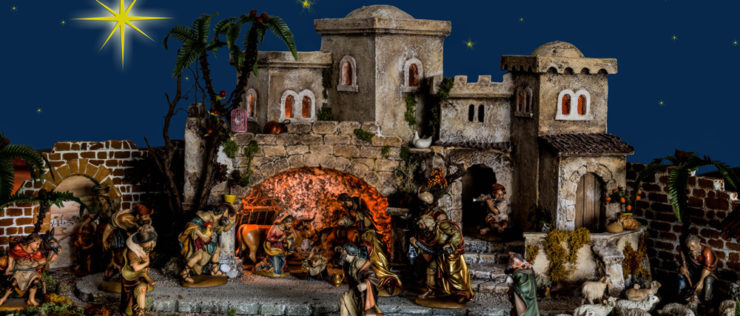The Old Testament prophet, Micah, lived and prophesied about 500 years before Jesus was born. Numerous other prophets reveal different things about the Messiah who was to come, but Micah even prophesies the name of the town, Bethlehem, in which He would be born. The name in Hebrew means “House of Bread”. How fitting for the One who will be described as the “Bread of God”, who came down from heaven to give life to the world. And, how fitting that this Messiah Redeemer, who would be a direct descendant of David, the king, born a thousand years after David, should also be born where His ancestor, King David, was born…Bethlehem. The angels announced those familiar words recited every Christmas, “For unto you is born this day, in the city of David, a Savior, which is Christ the Lord.”
From the outset, it would not appear that Mary, pregnant with Jesus, would give birth in Bethlehem, as they lived in Nazareth, several miles to the north of Bethlehem. Yet, in the providence of God, Caesar Augustus had issued his decree for the taking of a new census to determine the tax revenues, and everyone had to register in the place of their origin. So, off to Bethlehem they must go, because Joseph and Mary were of the house, or lineage, of David. And, did not the prophet Micah say it should be so? And Rome could be unforgiving and demanding whenever her revenue base was a concern…Bethlehem, the tiny town of David, where Jesus would be born shortly upon their arrival.
But, Micah, in his incredible prophecy that pinpointed the location of Messiah’s birth, had something else equally startling to prophecy. Listen to it, please… Micah 5:2, “But thou, Bethlehem Ephrata, though thou be little among the thousands of Judah, yet out of thee shall He come forth unto Me, that is to be Ruler in Israel, whose goings forth have been from of old from everlasting.” Did you hear that? Did you get it? Messiah birthplace, identified in itself, is stunning, but Micah isn’t finished. This One to be born in Bethlehem is also revealed to be the One who inhabits eternity. This One began His life as a man in Bethlehem, but He who came to the manger of Bethlehem stepped out of the glory in which He has existed from eternity past, “whose goings forth have been from of old from everlasting.”
What are the statistical probabilities of Micah merely guessing at these events? The numbers produced by the mathematical probability are followed by so many zeros it’s unpronounceable. So, are these things true? If not, what possible explanation for them can there be? This, from Micah, is but one of hundreds, all of which point to the unavoidable conclusion for a supernatural prophecy so exquisitely fulfilled.
CC-03-16


Published by